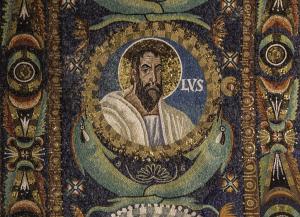
God’s love for humanity, indeed, God’s love for creation, did not diminish because of sin; rather, it is because of such love that God opposes sin and works to counteract its nihilistic destruction of being. God’s love is one eternal, unchanging act of love. We do not apprehend it in the way it actually is. We are temporal creatures. We grasp after that one unchangeable eternal act of God and apprehend something different each time we do so, making it seems as if it is God who is changing, when in reality, it is us. If we can collect all those apprehensions together, and see how they properly interconnect, we will be able to see how they are all a part of one single act, an act which transcends time itself.
God’s contention against sin is a done on our behalf, and, because God’s action is one eternal act of love, that contention itself is an eternal contention against sin. We cannot grasp all that God does to overcome sin, but we know, through the incarnation, that God’s love is always at work for us so that no matter how sullied we have become by our sin. We know God’s mercy and love works for us to receive the riches of the kingdom of God:
But God, who is rich in mercy, out of the great love with which he loved us, even when we were dead through our trespasses, made us alive together with Christ (by grace you have been saved), and raised us up with him, and made us sit with him in the heavenly places in Christ Jesus, that in the coming ages he might show the immeasurable riches of his grace in kindness toward us in Christ Jesus (Eph. 2:4-7 RSV).
God created us good, to continue to be good, and to do good. “For we are his workmanship, created in Christ Jesus for good works, which God prepared beforehand, that we should walk in them” (Eph. 4:10 RSV). We were created in the image and likeness of God, and we are expected to present that image and its grandeur to the rest of creation. When we sin, we do not destroy that image; it remains within us, even if it is obscured by our actions. It is this which God wants to help us uncover, and this is one of the many things God does for us thanks to the incarnation. Now, we can be restored to the kind of glory God intended for us, a glory which reflects the divine glory which inspired it, that is, the glory of love:
Do you see how after so much scrutiny and examination he does not turn away from (showing) mercy, caring for his creatures? Rather, he brings back the straying one, lifts up the fallen, raises the stumbler, restores the broken, heals the sick, cleanses the filthy one with tears, establishes the double-minded in faith, and enlightens everyone. [1]
We should not consider God’s mercy as making us weak, nor as making God weak; rather, we should understand it demonstrates how much more powerful God is than our sin. “Let us not be weakened, then, in the plan of God’s mercy. It restores us to innocence and to life.”[2] However much we have sinned, however much we continue to sin, God’s love remains unaltered. To be sure, God does not love the sin, but rather, God loves what sin obscures. God knows it is unnatural, that it is like a parasite which feeds off us. God knows that we need grace to eliminate its power over us. Sin, is destructive, it destroys the goodness of being, which is how and why it is the cause of its own punishment. When we talk about the retribution which comes from sin, it is the retribution which sin makes for us. God does not desire us to suffer that retribution, which is why God offers us mercy and grace to overcome the hold sin has over us, including the retribution it can make us suffer. That is, God’s mercy not only helps us overcome sin and its influence, but also helps slow down the power of sin to corrupt us and punish us, giving us more and more time to change our ways and not face any karmic retribution for our actions:
In spite of all these things, God remains well disposed toward everyone. To no one does he deny his mercy. Why, he even bestows many good things indiscriminately upon all. He prefers to invite with acts of kindness those whom he could rightly subdue with punishments. Delay in retribution makes room for repentance. It cannot be said, however, that there is no vengeance where conversion does not take place. For, a hard and ungrateful mind becomes already its own punishment. It suffers in its conscience whatever has been deferred by the goodness of God. [3]
Those who would deny others mercy, those who would deny others grace, resist God, and in that resistance, they are the ones sinning, creating for themselves the conditions for their own punishment unless they cast away that sin and receive mercy and grace.
Once we truly appreciate God’s eternal, gracious love seeks to lift everyone up, we will begin to understand the transcendent mystery of the Gospel itself: “This whole mystery (which both humanity and divinity have completed together) was a dispensation of mercy and an act of love.” [4] This is what Paul himself had to come to know and understand before he could truly see Christ and believe him to be who he said he was. Once he did so, Paul made that realization a central part of his teaching, not only dogmatically, but in relation to Christian praxis. The Christian life must not just be some theory about love, but it must reflect the implications of that love, revealing it to others. This is why he had to correct Peter’s actions when Peter would not eat with Gentile converts: Paul saw Peter needed to be reminded of the implications of Christ’s grace and what its reception and acceptance meant for Christians in their lives. No one should be seen as left out of God’s grace, as it is a gift to all. “For by grace you have been saved through faith; and this is not your own doing, it is the gift of God — not because of works, lest any man should boast” (Eph. 4:8-9 RSV). No one, especially no Christian, should boast of what they have done; rather, they should boast in Christ, and when they do so, they will boast in love, a love which will have them lift others up, sharing mercy and grace to the whole world.
[1] Moralia et Ascetica Armeniaca: The Oft-Repeated Discourses. Trans. Abraham Terian (Washington, DC: CUA Press, 2021), 100 [Discourse 5].
[2] St Leo the Great, Sermons. Trans. Jane Patricia Freeland CSJB and Agnes Josephine Conway SSJ (Washington, DC: CUA Press, 1996), 129 [Sermon 30].
[3] St Leo the Great, Sermons, 153-4 [Sermon 35].
[4] St Leo the Great, Sermons, 227 [Sermon 52].
Stay in touch! Like A Little Bit of Nothing on Facebook.
If you liked what you read, please consider sharing it with your friends and family!
N.B.: While I read comments to moderate them, I rarely respond to them. If I don’t respond to your comment directly, don’t assume I am unthankful for it. I appreciate it. But I want readers to feel free to ask questions, and hopefully, dialogue with each other. I have shared what I wanted to say, though some responses will get a brief reply by me, or, if I find it interesting and something I can engage fully, as the foundation for another post. I have had many posts inspired or improved upon thanks to my readers.













